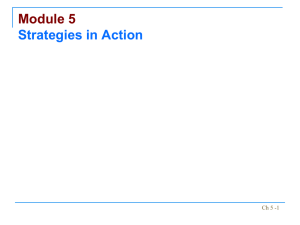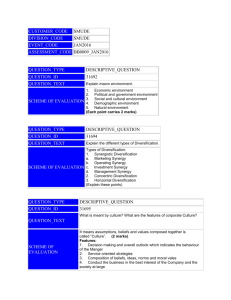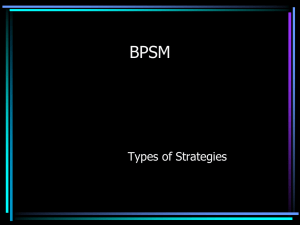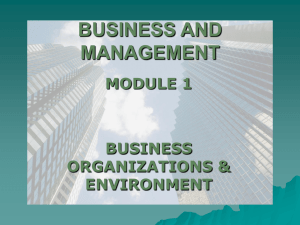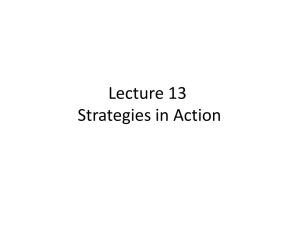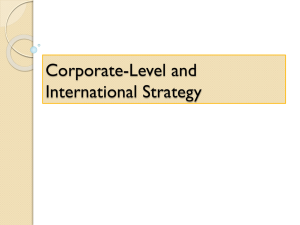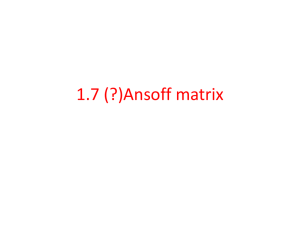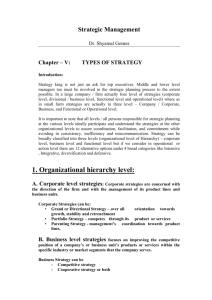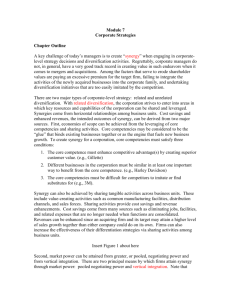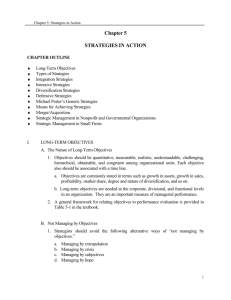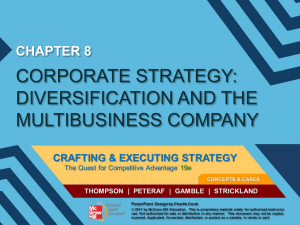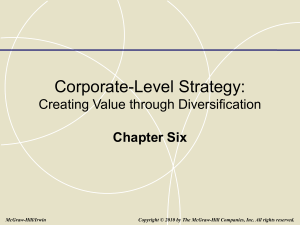File
advertisement
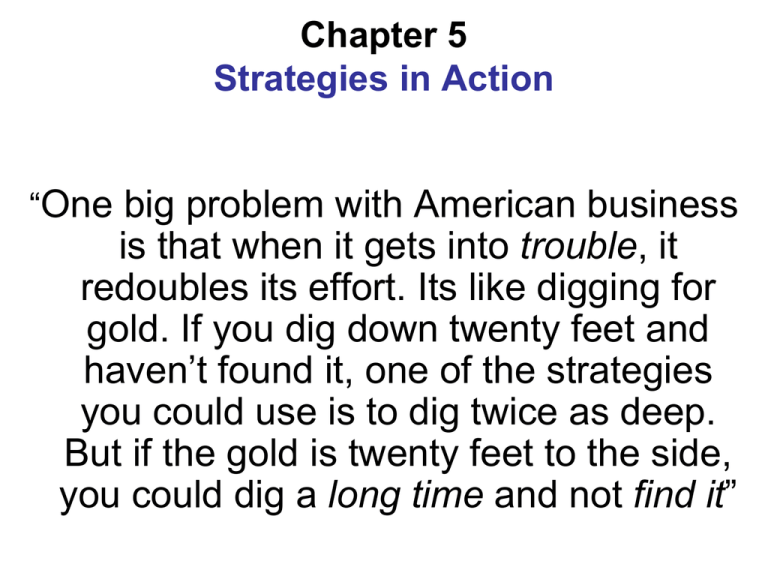
Chapter 5 Strategies in Action “One big problem with American business is that when it gets into trouble, it redoubles its effort. Its like digging for gold. If you dig down twenty feet and haven’t found it, one of the strategies you could use is to dig twice as deep. But if the gold is twenty feet to the side, you could dig a long time and not find it” Even if you’re on the right track, you’ll get run over if you just sit there Introduction ………………… Hundreds of company today, including IBM & HP embraced Strategic Planning for high revenues & profits Contemporary examples complimented by 16 Strategies are defined including Michael Porter’s Generic Strategies When it is appropriate to pursue different types of strategies….Guidelines presented Managerial approach is the expectation that it will enhance Org performance Strategic Management allows ORG’s to be efficient, but more important, it allows them to be effective SM doesn’t guarantee success, the process allows proactive rather reactive decision making 16 strategies- new beginning for firmsmanagers & employees in the ORG understand & support the plan for action Long-Term Objectives LTO represent the results expected from pursing certain strategies Strategies represent the actions to be taken to accomplish long-term objectives Objectives -- Quantifiable (increasing profits by 2%, decreasing scrap by 1%) Measurable (Not all goals can be expressed in numerical terms but vague goals have little motivating power for employees) Realistic (Goals should be challenging but not unreasonably difficult When goals are unrealistic, they set employees up for failure and lead to decreasing employee morale) Understandable (At the Top Org, goals often are qualitative as well as quantitative) Challenging (Kmart: set a goal to have more revenues than Wal-Mart next year) Long-Term Objectives Objectives - Hierarchical ? Obtainable (Managers should, however make sure that goals are set within the existing resource base, not beyond dept’s time, equipment & financial resource) Congruent (Consistent) Time-line (Goals should specify the time period over which the will be achieved) Long term objectives • Strategies represent the actions to be taken to accomplish LTO • Time Frame 2-5years • Table 5.1 (Bonuses /merit pay for managers must be based on LTO) • LTO serve as standards by which individuals, dept’s, division & entire ORG’s can be evaluated Financial vs. Strategic Objectives Financial Objectives Growth in revenues Growth in earnings Higher dividends Higher profit margins Higher Earnings per share Improved cash flow Dell Computer corporate objective to Grow revenues by 15% annually Through 2006 & to reach $60 billion In total revenues by that year Financial vs. Strategic Objectives Strategic Objectives Larger Market share quicker on-time delivery than rivals Shorter design to market times than rivals Lower costs than rivals Higher product quality Wider geographic coverage Achieving tech leadership Often times there is a trade-off between financial & strategic objectives such that a crucial decisions have to be made YOU NEED TO FIND OUT? Financial VS Strategic Objectives 1. If competitor pursue increased market share at the expense of short-term profitability----Danger is associated with trading LTO 2. Other trade offs between F&S objectives -Riskiness of actions Preserve the natural environment Social responsibility Concern for over business ethics Conclusion---Sustain competitive adv long run is to pursue ‘SO’.. Financial objectives can be met by focusing first on SO- to improve a firm’s competitiveness & market strength The Balanced Scorecard Robert Kaplan & David Norton -Strategy evaluation & control technique Balance financial measures with nonfinancial measures (product quality & customer service) BS contains strategic & financial Obj’s tailored to the Companies Balance shareholder objectives with customer & operational objectives Will be discussed later in chapter 9 The Balanced Scoreboard Theme is the same to evaluate firms strategy based upon quantitative & qualitative measures 3M FO– annual growth earnings per share 10% or better SO– at least 30% of shares from products introduced in the past 4 years Types of Strategies Combination strategy can be exceptionally risky if carried out too far Strategic planning involves “ Choices that risk resources” “ trade-offs that sacrifice opportunity” If you have a strategy to go north, then you must buy snowshoes & warm jackets (spend resources) &forgo the opportunity of population increases you would have by going south You cannot have a strategy to go north & then take a step east, south, or west “just to be on the safe side” Levels of Strategies A Large Company Corp Level Division Level Functional Level Operational Level Strategy making is not just a task for top executive All managers at all level must be involved Forward integration Gaining ownership or increased control over distributors or retailers Manufacturers (suppliers) today are pursuing a FIS by establishing Websites to directly sell products to consumers Dell establishing its own stores-within-astore….(Don’t stock computers-Customers will still order Dells by phone or over the internet-which differentiated Dell from other computer firms) Franchising (to distribute their products or services) Cost & opportunities are spread among many individuals That’s what you need to Find out ? Strategy of seeking ownership or increased control of a firm’s supplier Appropriate when a firm’s current suppliers are unreliable, too costly or cannot meet the firm’s needs Example: buy a box of Pampers diapers at WalMart, a scanner at the store’s checkout counter instantly zaps an order to P&G Co. Contrast- Hospitals, reordering supplies is a logistical nightmare…. Inefficiency of control of suppliers in the healthcare industry—Giant purchasers do more effective backward integration • Read Out……….. Strategy of seeking ownership of or increased control over a firm’s competitors Mergers, acquisitions & takeovers among competitors allow for increased economies of scale & enhanced transfer of resources & competencies • Read Out…………… Intensive Strategies Market penetration, market development & product development are sometimes referred to as intensive strategies because they require intensive efforts if a firm’s competitive position with existing products is to improve Seeks to increase market share for present products or services in present markets through greater marketing efforts Used alone & in combination with other strategies Increasing number of salespersons, increasing advertising expenditures, offering extensive sales promotion items or increasing publicity efforts Sony is spending over $140M in a new advertising & promotion drive to market HDTV sets in the U.S (Bravia) Sony- setting up special tents to promote Bravia at 1000 stores in America When the usage rate of present customers could be increased significantly When the market shares of major competitors have been declining while total industry sales have been increasing When increased economies of scale provide major competitive adv When current markets are not saturated with a particular product or service when the correlation btw $sales & $ marketing expenditure historically has been high Market Development Involves introducing present products or services into new geographic areas Adidas in 2005 had 1500 stores in China & stated that it would open another 40 stores every month in china for the next 40 months United Parcel Service (UPS) is building new cargo hub in shanghai– UPS planning to compete in China with FedEx & DHL Guidelines for when market development may be an especially effective strategy • When an org is very successful at what it does • When an Org has the needed capital & HR to manage expanded operations • Excess production capacity • Org basic industry is becoming rapidly global in scope Product Development Strategy that seeks increased sales by improving or modifying present products or services Usually entails large research and development expenditures Coca-Cola introducing Zero which underscore the growing popularity of diet soft drinks at the expense of sugary drinks. Sales in sugary drinks fell 3%. Diet drinks now have 29.1% market share & that is growing. Many teenagers & young adults ditched regular colas in favor of bottled water & diet drinks McDonald’s design your own deli sandwiches (chicken salad blended with pecans, apples & grapes) Guidelines for when Product development may be an especially effective strategy….. When an organization has successful products that are in the maturity stage of the product life cycle; the idea here is to attract satisfied customers to try new (improved) products as a result of their positive experience with the Org present products or services When major competitors offer better quality products at comparable prices When an organization competes in a high growth industry Org has strong R&D capabilities Diversification Strategies Business are said to be related when their value chains posses competitively valuable cross-business strategic fits; businesses are said to be unrelated when their value chain are so dissimilar that no competitively valuable cross-business relationship exist Diversification Continue…….. Becoming less popular as organizations are finding it more difficult to manage diverse business activities 1960’s-70’s trend was to diversify so as not to be dependent on any single industry But 1980’s saw a general reversal of that thinking M.Porter “Management found it couldn’t manage the beast”– hence business selling or closing less profitable divisions in order to focus on core businesses Diversification Continue…….. • Being in single industry is having all of the firm’s eggs in one basket • New technologies, new products or fast shifting buyer preferences can decimate particular business • Diversification must do more than simply spread business risk across different industries • Strategy adds more to share holder value …… Related Diversification Entering a new business or industry to create a competitive advantage in one or more of an organizations existing divisions or businesses Synergy is obtained when value created by two divisions cooperating is greater than the value that would be created if the two divisions operated separately • Amazon. COM recent move to sell Personal Computers through its online store • Dell manufacturing & marketing consumer electronics products such as flat-panel TV & MP3 players- opened online music-downloading store • Dell sees the PC business more aligned with the entertainment business because both are becoming more & more digital • Computing & consumer electronics are converging into one industry • Dell, HP, Gateway compete with Sony, Matsushita & Samsung •Joint sales force •Same distribution system Procter & Gamble’s Paper Products Paper towel Shaving Skin Care Hair Care Disposable diaper Businesses share one of the best examples of the successful production of synergies Share the costs of producing inputs such as paper & developing new technology to reduce manufacturing costs Guidelines ….. • When Org competes in no-growth or slow growth industry • When adding new, but related products would significantly enhance the sales of current products • When an org products are currently in the declining stage of the products life cycle • When an org has a strong management team Unrelated Diversification Strategy favors capitalizing upon a portfolio of businesses that are capable of delivering excellent financial performance in their respective industries, rather than striving to capitalize on value chain strategic fits among the businesses Search different industries for Companies that could be acquired for a deal & yet have potential to provide a high return on investment Hunt to acquire Co.’s hat have growth prospects but are short on investment capital GE owns NBC Walt Disney owns ABC & CBS Three major TV networks are all owned by diversified firms “Unless we diversify our revenue, we wont be able to fulfill our mission of providing healthcare. We want our hospital to be a place that people want to go to” Hospitals creating malls by offering Banks, bookstores, coffee shops, restaurants & other retail stores… improving ambiance for patients & their visitors Guidelines ………….. When revenues derived from an organization’s current products or services would increase significantly by adding new, unrelated products When an Org present channels of distribution can be used to market the new products to current customers When an Org basic industry is experiencing declining annual sales & profits Occurs when an organization regroups through cost and asset reduction to reverse declining sales & profits Sometimes called turnaround or reorganizational strategy Entail selling off land & buildings to raise needed cash, pruning products lines, closing marginal businesses, closing obsolete factories, automating processes, reducing the number of employees & instituting expense control systems Retrenchment Continue…. Winn-Dixie is pursing a retrenchment strategy in 2005 to 2006 by closing one third of its stores & eliminating 22,000 jobs, representing 28% of its workforce Trying to emerge from Chapter 11 bankruptcy Bankruptcy can be effective type of retrenchment strategy Five major types of bankruptcy Chapter 7, 9, 11, 12, 13 (You find out) Divestiture Selling a division or part of an Org Used to raise capital for further strategy to rid an Org of businesses that are unprofitable- require too much capital- do not fit well with the firm’s other activities Example: Unilever recently sold its perfume business, including brands CK to Coty Inc. for $800M Adidas divested ski-equipment maker Salomon-which was its least profitable division Guidelines • When an Org has pursued a retrenchment strategy & failed to accomplish needed improvements • Division needs more resources to be competitive than the company can provide • When a division is responsible for an Org’s overall poor performance ………. Liquidation • Selling all of a company’s assets in parts for their tangible worth • Recognition of defeat & consequently can be an emotionally difficult strategy • Better to cease operating than to continue losing large sums of money • Example: AOL filed for bankruptcy protection in mid 2005 & announced plans to liquidate its business Guidelines When an Org has pursued both a Retrenchment strategy & a divestitute strategy & neither has been successful When Org’s only alternative is banktruptcy Liquidation represents an orderly & planned means of obtaining the greatest possible cash for an Org assets A company can legally declare bankruptcy first & then liquidate various divisions to raise needed capital Michael Porters Five Generic Strategies Cost leadership –Low cost (Type 1) Cost Leadership – Best Value (Type 2) Differentiation (Type 3) Focus-Low Cost (Type 4) Focus-Best Value (Type 5) Do it yourself Joint Ventures / Partnering Merger / Acquisition First Mover Advantages Outsourcing Joint Venture / Partnering • Two or more companies form a temporary partnership or consortium for the purpose of capitalizing on some opportunity • Often used to pursue an opportunity that is too complex, uneconomical, or risky for a single firm to pursue alone • JV & Partnerships, alliances are proving to be more effective way to enhance corporate growth than Mergers & Acquisitions VA & Partnering ………….continue • Take many forms including – outsourcing, information sharing, joint marketing and R&D • 10,000 JV’s formed annually, more than all mergers & acquistions – Starbucks’ JV with China’s president coffee to open hundreds of SB coffee shops in China (building Chinese taste for coffee) – Microsoft Online service division JV with Shanghai alliance investment to launch MSN China throughout China Concluding thoughts JV are preferred over M&A as a means of achieving strategies, certainly they are not all successful- Good news is that JV are less risky but bad news is that many alliances fail Statistics you have to find out Mergers & Acquisitions Merger occurs when two organizations of about equal size unite to form one enterprise Acquisition occurs when a large organization purchases (acquires) a smaller firm, or vice versa M&A not desired by both parties – take over or hostile takeover In contrast, if the acquisitions is desired by both firms, it is termed as friendly merger There are number or reasons (forces) which drives companies to merger around the world ( You to find out :Hint for exams ) Not all mergers are successful Some key reasons for their failures are ? Many reasons for companies to merge and acquire ? First Mover Advantages Benefits a firm may achieve by entering a new market or developing a new product or service prior to rival firms. Outsourcing Business-process outsourcing (BPO) Companies taking over the functional operations of other firms Types of Strategies Forward Integration Vertical Integration Strategies Backward Integration Horizontal Integration Types of Strategies Market Penetration Intensive Strategies Market Development Product Development Types of Strategies Related Diversification Diversification Strategies Unrelated Diversification Types of Strategies Retrenchment Defensive Strategies Divestiture Liquidation 2003 Examples Forward Integration Budget Rent-a-Car is opening car rental shops in Wal-Mart stores. Backward Integration McDonalds recently acquired a paper cup producer Hotels, Inc. purchased a furniture producer Horizontal Integration Federated Dept stores, the parent of Macy’s & Bloomingdale’s acquired May dept stores Callaway Golf recently acquired TopFlite Golf Company 2003 Examples Market Penetration Market Development Product Development Coca-Cola Co. is spending millions to advertise its new zero calorie drink called CocaCola Zero Bank of America recently purchased a 9% stake in China Construction Bank- 4th largest lender. BOA first big move into China GM developing hydrogen powered automobiles Pfizer developing a new antismoking pill 2003 Examples Related Diversification Unrelated Diversification Microsoft launched its first personal computers that double as entertainment centers The video-rental firm Blockbuster may acquire the DVD and music directmarketing firm Columbia House Tupperware Corp., the direct seller of kitchenware, has entered & is growing its skin & beauty business through BeautiControl 2003 Examples Retrenchment Divestiture Liquidation America West Airlines closing its hub at Columbus, Ohio and laying off 390 employees ConocoPhillips recently sold its Circle K convenience store chain to Alimentation CoucheTard, a Canadian firm Sprint liquidated its Webhosting division Britain’s last major car manufacturer, MG Rover liquidated in 2005 & laid off its 5000 employee Michael Porter’s Generic Strategies Cost Leadership Strategies Differentiation Strategies Focus Strategies Recent Mergers Acquiring Firm Acquired Firm IBM Rational Software Corp Yahoo Inktomi Corp U.S. Steel National Steel Corp Pfizer Pharmacia Krispy Kreme Doughnuts Oracle Palm Nike Montana Mills People Soft Handspring Converse
